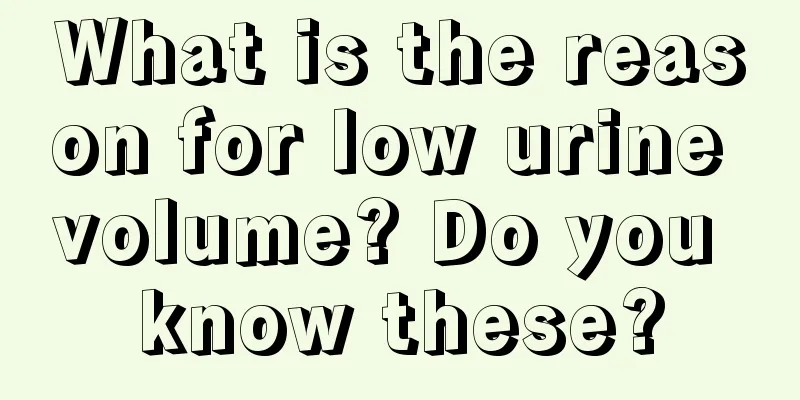What is the reason for low urine volume? Do you know these?

|
Low urine volume is a very serious disease. Many people in life think that low urine volume is no problem and always ignore it. In fact, this will only delay the condition of the body. If a person's daily urine volume is only 500 ml, it is a phenomenon of oliguria. When this phenomenon occurs, you must be alert and pay attention to your body. So what is going on when the body experiences low urine output? (1) Hypovolemia: It starts with functional oliguria and anuria, and the urine volume recovers immediately once the blood volume is replenished. If not diagnosed and treated in time, it may cause organic kidney damage and acute renal failure, manifested as low urine volume and anuria, which is seen in severe dehydration, massive bleeding, large-area burns, etc. (2) Shock: Shock due to various reasons causes a decrease in renal perfusion pressure and a serious deficiency in glomerular filtration rate. It is seen in anaphylactic shock, hemorrhagic shock, cardiogenic shock, infectious and toxic shock, etc. (3) Decreased cardiac output: At this time, the blood supply to the kidneys decreases significantly, which is seen in left heart failure, severe arrhythmias, cardiac tamponade and constrictive pericarditis. (4) Hepatorenal syndrome: In the late stage of cirrhosis, there is severe ascites and severe renal hypoperfusion, which manifests as low urine volume or anuria. Once the ascites of cirrhosis is relieved, the kidneys will recover and the urine volume will increase. 2. Renal low urine output (1) Renal parenchymal damage: Whether it is primary glomerulonephritis or secondary to systemic lupus erythematosus, polyarteritis nodosa, infective endocarditis, dermatomyositis, etc., it can cause renal parenchymal damage and even renal function damage or failure, resulting in low urine output. (2) Renal interstitial disease: The most common drug allergies such as penicillin, sulfonamides, rifampicin, aminoglycoside antibiotics, etc. cause renal interstitial damage. (3) Renal vascular diseases: renal cortical vasospasm or embolism, reduced renal blood supply causing oliguria, seen in disseminated intravascular coagulation, large area burns, etc. 3. Postrenal indigestion is common in cases of urinary tract obstruction such as stones, tumors, prostate hypertrophy or prostate cancer. |
<<: What's wrong with trace urine protein? 7 things you need to pay attention to
>>: Why does the left side of my stomach hurt? Here’s the reason
Recommend
Chinese medicine can cure brain cancer headache
At present in our country, due to the continuous ...
How to use hyaluronic acid chin injection?
Hyaluronic acid injection is already a very commo...
What are the correct ways to use beauty serum
A beauty serum is actually a kind of skin care es...
How to quickly pick out bird's nest hair
Bird's nest is a very nutritious substance an...
What is the cause of bloodshot eyes
Every day people either work in front of computer...
How to deal with itchy scalp and dandruff?
Hair is the hair on the top of people's heads...
Does IVF require surgery?
Many infertile patients cannot successfully becom...
What are the hazards of flaxseed oil
As we all know, flaxseed blended oil, as the name...
How to diagnose asthma with high accuracy?
Asthma is an extremely serious disease. If it is ...
What causes severe cardiac edema?
The heart is one of the most important organs in ...
What causes puffy eyelids and face?
We often find that many people's eyes and fac...
Causes of recurrence of lymphoma
Every patient with lymphoma has undergone chemoth...
What foods can relieve heart enlargement?
The heart, like the brain, is a very important or...
How to reduce swelling after getting hit on the face
The face is a very important part of the human bo...
How to treat cervical cancer? Is it reliable to use traditional Chinese medicine to treat cervical cancer?
Cervical cancer is one of the common malignant tu...









